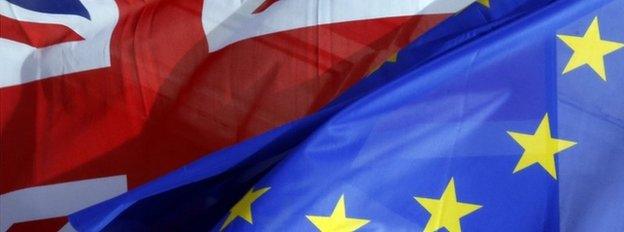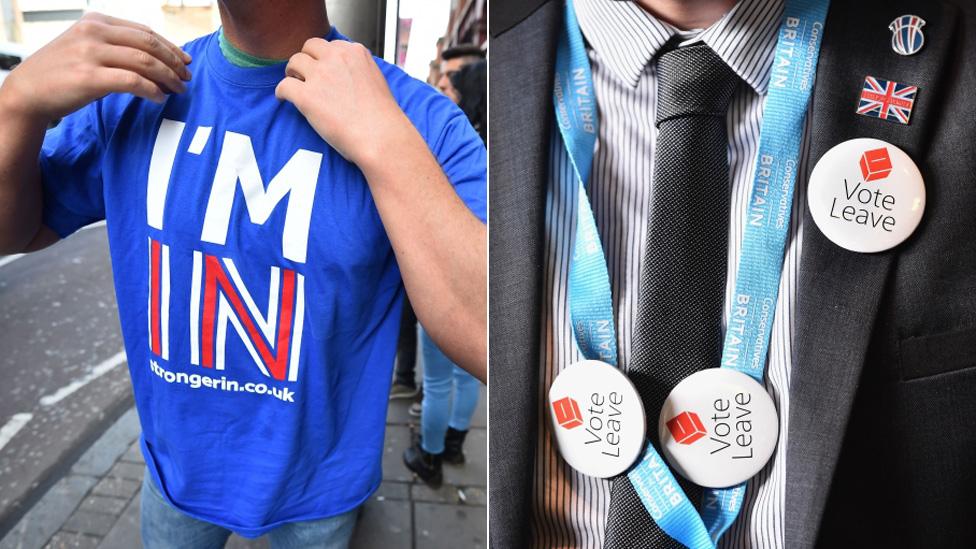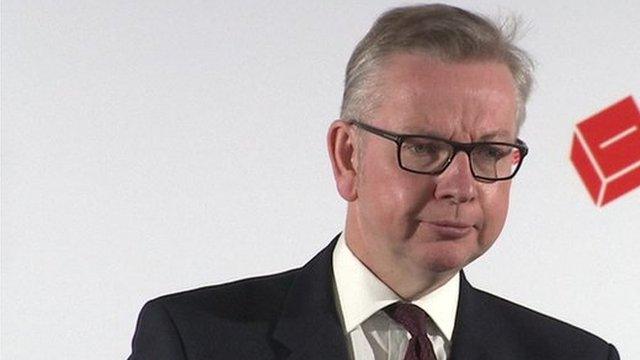EU referendum: Brexit 'could damage NHS', health boss warns
- Published
Simon Stevens: " It would be very dangerous if at precisely the moment the NHS is going to need extra funding, the economy goes into a tailspin"
Leaving the EU could damage the health service, NHS England chief executive Simon Stevens has warned.
He said he took warnings of possible recession in the event of Brexit "very seriously", adding that would be "very dangerous" for the service.
"When the British economy sneezes, the NHS catches a cold," he said, adding it would be a "terrible moment" at a time when the NHS needed extra investment.
Vote Leave's Lord Owen said staying in the EU was more of a risk.
Follow the latest on the EU campaign
The UK's EU vote: All you need to know
With little over a month to go until the 23 June referendum, rival camps are highlighting the core issues of the economy and immigration.
Mr Stevens's comments come after Bank of England governor Mark Carney warned voting to leave the EU could hit the economy, saying that the risks could "possibly include a technical recession".
'Extra investment'
The NHS England boss told BBC One's Andrew Marr Show: "If Mark Carney is right, then that is a severe concern for the National Health Service, because it would be very dangerous if at precisely the moment the NHS is going to need extra funding, actually the economy goes into a tailspin and that funding is not there.
"It's been true for 68 years of NHS history that when the British economy sneezes, the NHS catches a cold and this would be a terrible moment for that to happen at precisely the time the NHS is going to need extra investment."
But former foreign secretary Lord Owen told the BBC's Sunday Politics: "Simon Stevens is the manager of the NHS which is currently £3bn in debt.
"This man has presided now for a sufficient time to judge his management skills. In almost every part of the National Health Service there is an acute crisis."
He said Mr Stevens should focus on managing the health service "a great deal more successfully", and added: "If there is any danger to the NHS, it is staying in with all the elements of the NHS which are now involved with the EU."

Analysis
By Hugh Pym, BBC health editor
Simon Stevens's starting point was that if the governor of the Bank of England believed Brexit would damage the economy, he was obliged to point out the risk to the health service.
As he put it, if the economy sneezes the NHS catches a cold because public funding is undermined. He argued that the net increase in funds available to the government if the UK left the EU would not add up to much for the NHS.
He conceded that it was hard to predict the impact Brexit might have on migration to the UK and hence demand for healthcare. As with so much of the EU debate, there are many unknowns.
Vote Leave campaigners say officials like Mark Carney and Simon Stevens are part of an establishment attempt to create public hysteria over Brexit.
Mr Stevens clearly feels he needs to say his piece before the British public decides.

Mr Stevens rejected the idea, suggested by Leave campaigners, that exiting the EU would free up money that currently goes to Brussels. At best, this would fund the NHS for 19 days a year, he argued.
Leave campaigner Penny Mordaunt had told Marr there would be more chance to spend more on the NHS with the £10bn dividend.
The armed forces minister also said the NHS needed the ability to plan better and that uncontrolled immigration made it "impossible" for public services to do so.
Asked about the impact of EU migrants on the health service, Mr Stevens said: "It clearly is the case that where those migrants are paying taxes that is contributing to the revenues that can afford an expanding NHS.
"When the NHS was set up in 1948 we had a population of 50 million - we're at 65 million now - and the NHS has perfectly, successfully coped with a 15 million expansion in our population. Provided it is properly resourced from the proceeds of economic growth, it can do that."
Lord Owen: "If there's any danger to the NHS, it's staying in"
Mr Stevens also said the NHS had "benefited enormously" from having doctors, nurses and care workers from the EU working within the health service.
There would be an impact if any of those 130,000 staff chose to leave the NHS because of uncertainty over work visas if the UK left the EU, he added.
It could also be difficult for the UK to get treatments at an affordable price if the pound were affected by Brexit, because many drugs are priced in euros and dollars.
Mr Stevens also told the show he believed that NHS England's deficit would come down "substantially" next year and that there was enough funding in place for the current year, but added: "The NHS will need to be able to share the fruits of economic growth in this country and that's why it's critically important for the NHS that the British economy continues to do well."

EU referendum: In depth


Mr Carney has been criticised for becoming involved in the debate, but Mr Stevens said: "Everybody else has got an opinion about the NHS. It is perfectly reasonable for the NHS itself, when asked, to lay out the balance of the advantage in an objective, non-sensationalist way."
Prime Minister David Cameron later told ITV show Peston on Sunday that the country "wants to hear" from people like Mr Carney and Mr Stevens.
And shadow health secretary Heidi Alexander said: "I would be the first to criticise the Tories' appalling record on the NHS.
"However, if we vote to leave the EU on 23 June we risk plunging the NHS into an even deeper crisis - a crisis that could leave us with fewer doctors, fewer nurses and frontline services at risk of closure."
- Published22 May 2016

- Published21 May 2016

- Published20 May 2016
